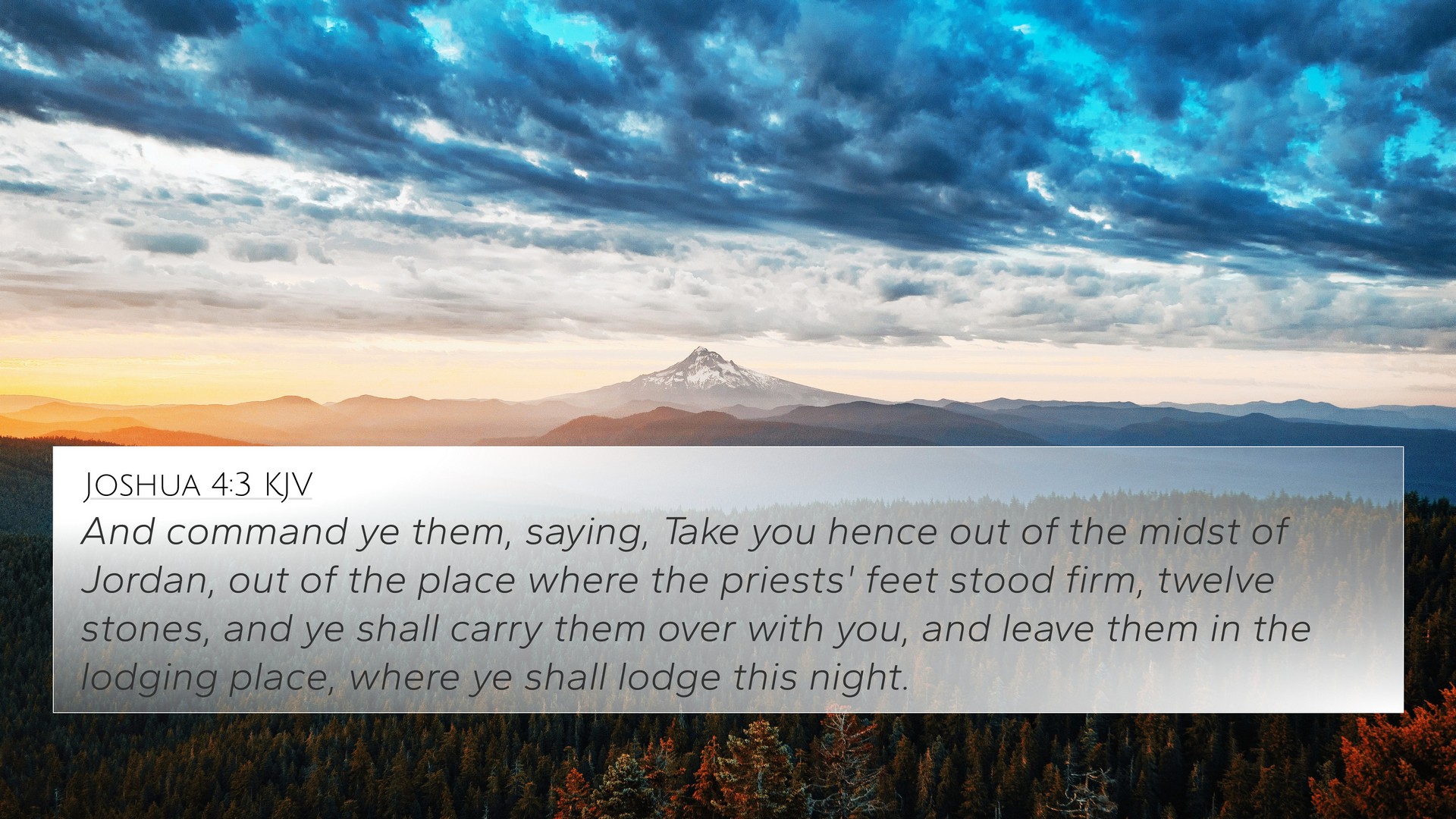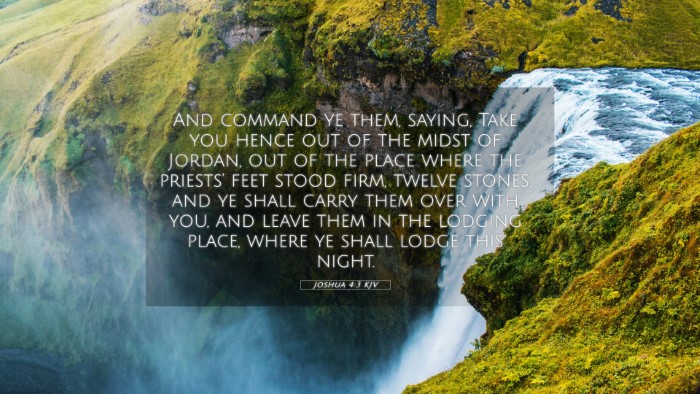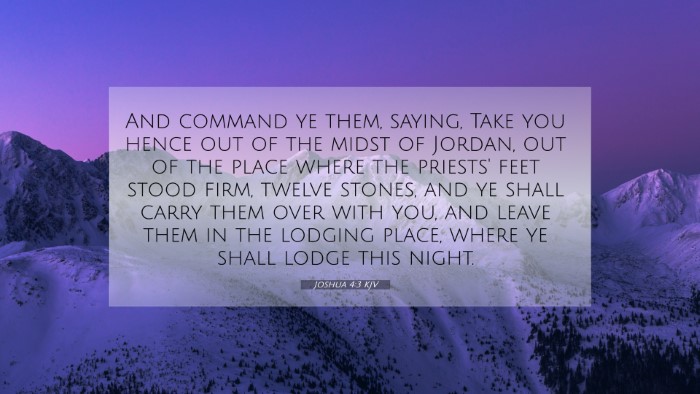Old Testament
Genesis Exodus Leviticus Numbers Deuteronomy Joshua Judges Ruth 1 Samuel 2 Samuel 1 Kings 2 Kings 1 Chronicles 2 Chronicles Ezra Nehemiah Esther Job Psalms Proverbs Ecclesiastes Song of Solomon Isaiah Jeremiah Lamentations Ezekiel Daniel Hosea Joel Amos Obadiah Jonah Micah Nahum Habakkuk Zephaniah Haggai Zechariah MalachiJoshua 4:3 Similar Verses
Joshua 4:3 Cross References
And command ye them, saying, Take you hence out of the midst of Jordan, out of the place where the priests' feet stood firm, twelve stones, and ye shall carry them over with you, and leave them in the lodging place, where ye shall lodge this night.
Uncover the Rich Themes and Topics of This Bible Verse
Listed below are the Bible themes associated with Joshua 4:3. We invite you to explore each theme to gain deeper insights into the Scriptures.
Joshua 4:3 Cross Reference Verses
This section features a detailed cross-reference designed to enrich your understanding of the Scriptures. Below, you will find carefully selected verses that echo the themes and teachings related to Joshua 4:3 KJV. Click on any image to explore detailed analyses of related Bible verses and uncover deeper theological insights.
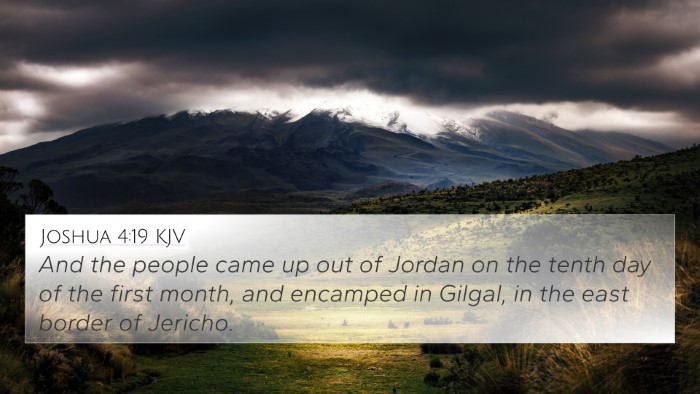
Joshua 4:19 (KJV) »
And the people came up out of Jordan on the tenth day of the first month, and encamped in Gilgal, in the east border of Jericho.
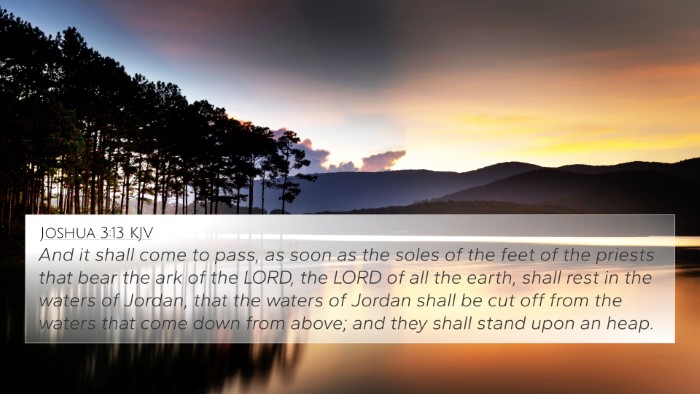
Joshua 3:13 (KJV) »
And it shall come to pass, as soon as the soles of the feet of the priests that bear the ark of the LORD, the LORD of all the earth, shall rest in the waters of Jordan, that the waters of Jordan shall be cut off from the waters that come down from above; and they shall stand upon an heap.
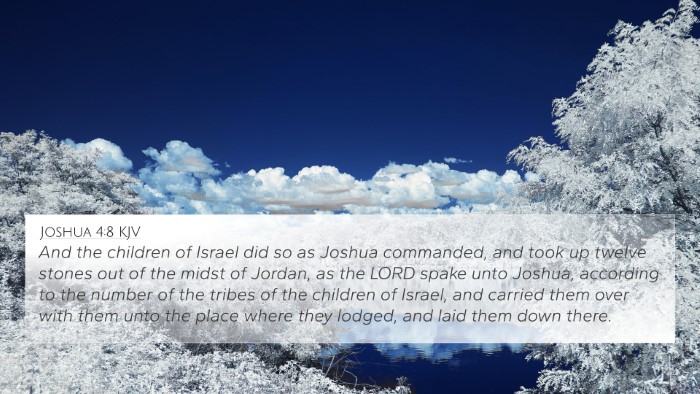
Joshua 4:8 (KJV) »
And the children of Israel did so as Joshua commanded, and took up twelve stones out of the midst of Jordan, as the LORD spake unto Joshua, according to the number of the tribes of the children of Israel, and carried them over with them unto the place where they lodged, and laid them down there.
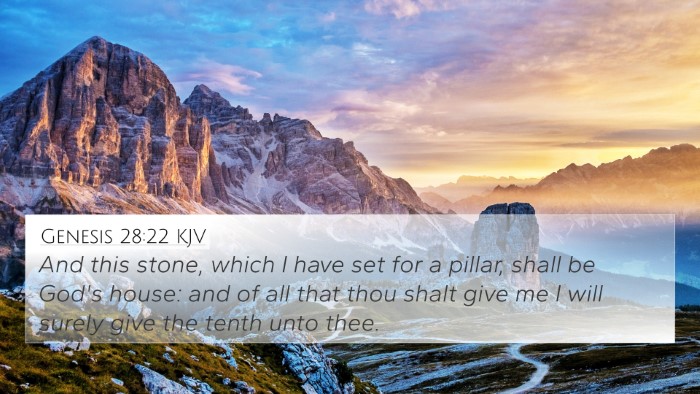
Genesis 28:22 (KJV) »
And this stone, which I have set for a pillar, shall be God's house: and of all that thou shalt give me I will surely give the tenth unto thee.

Psalms 11:4 (KJV) »
The LORD is in his holy temple, the LORD's throne is in heaven: his eyes behold, his eyelids try, the children of men.
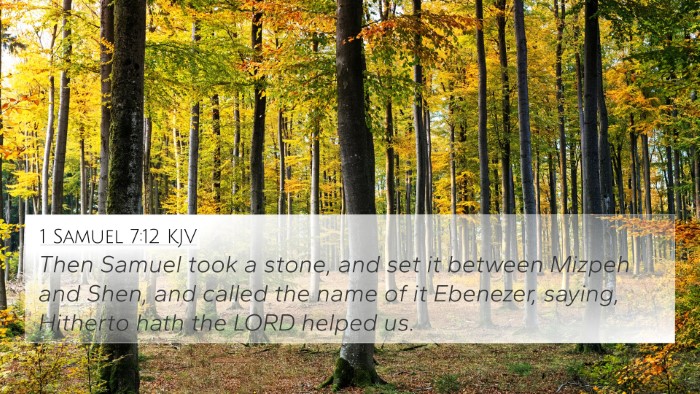
1 Samuel 7:12 (KJV) »
Then Samuel took a stone, and set it between Mizpeh and Shen, and called the name of it Ebenezer, saying, Hitherto hath the LORD helped us.
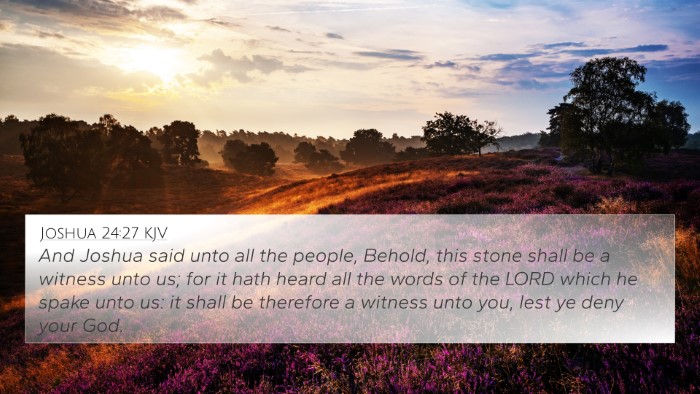
Joshua 24:27 (KJV) »
And Joshua said unto all the people, Behold, this stone shall be a witness unto us; for it hath heard all the words of the LORD which he spake unto us: it shall be therefore a witness unto you, lest ye deny your God.
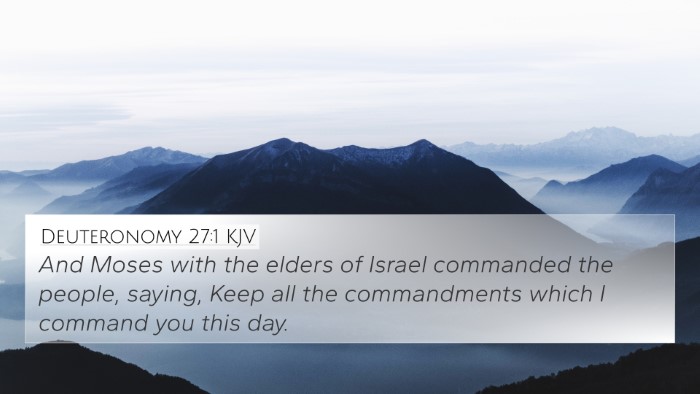
Deuteronomy 27:1 (KJV) »
And Moses with the elders of Israel commanded the people, saying, Keep all the commandments which I command you this day.
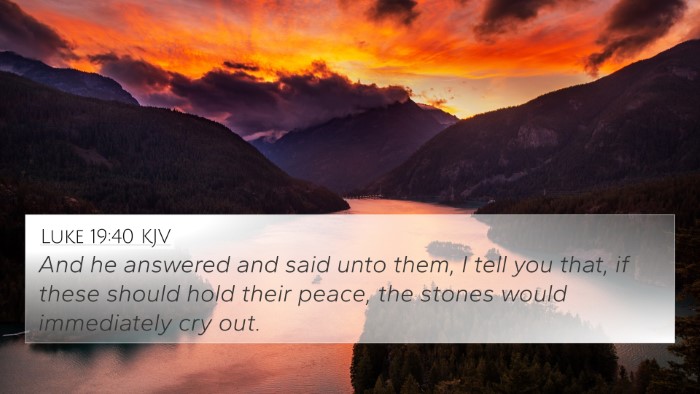
Luke 19:40 (KJV) »
And he answered and said unto them, I tell you that, if these should hold their peace, the stones would immediately cry out.
Joshua 4:3 Verse Analysis and Similar Verses
Understanding Joshua 4:3
Joshua 4:3 states: "And command ye them, saying, Take you hence out of the midst of Jordan, out of the place where the priests' feet stood firm, twelve stones, and ye shall carry them over with you, and leave them in the lodging place where ye shall lodge this night."
This verse occurs during the miraculous crossing of the Jordan River where the Israelites, led by Joshua, are on the brink of entering the Promised Land. The instruction to collect twelve stones serves a significant memorial purpose. Analyzing this verse through the perspectives provided by esteemed biblical commentators provides deeper insights into its significance and implications.
Key Themes and Interpretations
-
Memorials and Remembrance:
Matthew Henry points out that the twelve stones symbolize God's monumental acts and serve as a physical reminder of the miracles He performed for Israel. They function as a teaching tool for future generations about God's faithfulness and power.
-
The Role of Leaders:
Albert Barnes highlights the importance of leadership exhibited by Joshua, where he acts as a mediator between God and the people, conveying divine instructions to ensure the continuity of faith among the Israelites.
-
The Significance of Number Twelve:
Adam Clarke elaborates on the choice of twelve stones, suggesting that they represent the twelve tribes of Israel, emphasizing the unity and collective identity of God's chosen people in their covenant relationship with Him.
-
Obedience to God's Commands:
Each commentator stresses the theme of obedience. The Israelites' prompt compliance with God's command to collect the stones indicates their faith in His promises and their commitment to His covenant.
-
Communal Responsibility:
The act of taking the stones together reflects a communal venture, symbolizing the shared identity and responsibility of the Israelites in remembering God's deliverance.
Cross-References to Joshua 4:3
Several Bible verses relate to Joshua 4:3, linking various themes and demonstrating God's covenantal engagement with His people. Below are key cross-references:
- Exodus 12:26-27: Israelites instructed to commemorate the Passover.
- Deuteronomy 6:6-9: Emphasis on teaching future generations about God's commands.
- Joshua 4:6: Clarifies the memorial purpose of the stones.
- 1 Samuel 7:12: Samuel erects a stone called Ebenezer as a reminder of God's help.
- Psalms 78:4-7: The importance of recounting God's deeds to future generations.
- Matthew 5:14: Believers as a light set on a hill, signifying visibility to all nations.
- Romans 15:4: Scriptures provide hope and encouragement through past examples.
- Hebrews 11:1-3: Faith as a belief in things hoped for, shaping the identity of God's people.
- Revelation 21:12: The new Jerusalem has twelve gates, symbolizing God's kingdom's fullness.
- 1 Corinthians 11:24-25: Jesus’ act of remembrance during the Last Supper reflects on memorial acts.
Application of Joshua 4:3
Reflecting on Joshua 4:3 allows modern believers to engage with their faith through the practice of remembrance. Just as the Israelites were instructed to remember their deliverance, Christians are encouraged to memorialize God's work in their lives—creating traditions that focus on thanksgiving and recognition of God's guidance.
Additionally, the instructions regarding memorial stones highlight the value of physical reminders in spiritual life. For instance, churches often create memorials or hold communion services to encourage the community's remembrance of Christ’s sacrifice and the history of God's redemptive work.
Conclusion
The study of Joshua 4:3, along with its connections to other biblical texts, illustrates profound spiritual truths about remembrance, obedience, and community. By considering these themes across scripture, believers can nurture a deeper appreciation of their spiritual heritage and responsibilities. As one explores these connections, utilizing tools for Bible cross-referencing can greatly enhance understanding, making it a vital part of deeper biblical study.
